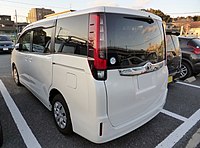Toyota Noah
| Toyota Noah | |
|---|---|
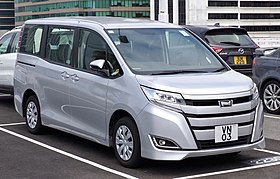 2018 Toyota Noah X | |
| Overview | |
| Manufacturer | Toyota |
| Also called |
|
| Production | November 2001[1] – present |
| Body and chassis | |
| Class | Minivan |
| Body style | 5-door van |
| Layout | |
| Chronology | |
| Predecessor | Toyota LiteAce/TownAce Noah (R40/R50) |
The Toyota Noah (Japanese:トヨタ・ノア, Toyota Noa) is a seven or eight-seat minivan with two rear sliding doors built by Toyota and sold mainly in Asian countries. It is positioned below the Estima and Alphard, and above the Sienta. It replaces the LiteAce/TownAce Noah, retaining the "R" model code and generation numbering. The Noah has two twin versions. Initially, at launch, it only had one version, named the Toyota Voxy (Japanese:トヨタ・ヴォクシー, Toyota Vokushī), which was intended to be the sportier version of the Noah, featuring split headlamps and clear taillights, however, starting from the third-generation, a luxury version of the Noah was introduced, named the Toyota Esquire (Japanese:トヨタ・エスクァイア, Toyota Esukwaia), sporting a different grille design and more premium interior. The Noah is exclusive to Toyota Corolla Store Japanese dealerships, the Voxy to Netz Store and the Esquire to Toyopet Store. Its main competitors are the Honda Stepwgn, Mazda Biante and Nissan Serena. Its sales in Japan are enhanced by the fact that the exterior dimensions comply with the Japanese dimension regulations for compact vehicles, and the engine displacement is under 2,000 cc to keep the annual road tax affordable for private purchase.
On May 1, 2020, the Noah, Voxy and Esquire became available at all Toyota dealership sales channels in Japan (Toyota Store, Toyopet Store, Corolla Store and Netz).
First generation (R60; 2001)[]
| First generation (R60) | |
|---|---|
 2001–2004 Noah X (pre-facelift) | |
| Overview | |
| Also called | Toyota Voxy |
| Production | November 2001[1] – June 2007 |
| Assembly | Japan: Kariya, Aichi (Toyota Auto Body)[1] |
| Powertrain | |
| Engine | 2.0 L 1AZ-FSE direct-injected I4 (petrol) |
| Transmission | |
| Dimensions | |
| Wheelbase | 2,825 mm (111.2 in) |
| Length | 4,580–4,625 mm (180.3–182.1 in) |
| Width | 1,695 mm (66.7 in) |
| Height | 1,850 mm (72.8 in) |
| Curb weight | 1,500 kg (3,307 lb) |
The first generation Noah was released in November 2001, alongside the Voxy. The facelift model was released in August 2004, and discontinued in June 2007.
Gallery[]
- Noah
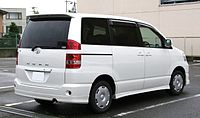
2001–2004 Noah X (pre-facelift)

2004–2007 Noah X (facelift)
- Voxy

2001–2004 Voxy X (pre-facelift)
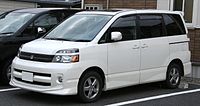
2004–2007 Voxy Z (facelift)

2005 Voxy
Second generation (R70; 2007)[]
| Second generation (R70) | |
|---|---|
 2007–2010 Noah X (pre-facelift) | |
| Overview | |
| Also called |
|
| Production |
|
| Assembly | |
| Powertrain | |
| Engine |
|
| Transmission | CVT |
| Dimensions | |
| Wheelbase | 2,825 mm (111.2 in) |
| Length | 4,595–4,630 mm (180.9–182.3 in) |
| Width | 1,695–1,720 mm (66.7–67.7 in) |
| Height | 1,850–1,875 mm (72.8–73.8 in) |
| Curb weight | 1,550–1,700 kg (3,417–3,748 lb) |
The second-generation Noah and Voxy were released in June 2007. The facelift model was released in April 2010, and discontinued in January 2014.
For 2007 models on Japanese models only, G-BOOK, a subscription telematics service is available as an option.
Indonesia[]
In Indonesia, the facelifted Noah was launched on December 11, 2012 as the Toyota NAV1. It was assembled locally at the Bekasi plant. It was available in two trim levels, G and V, and was launched to fill the gap between the Kijang Innova and the Alphard. The engine used is the 2.0 L 3ZR-FAE petrol inline-four mated with a continuously variable transmission.[3][4]
In 2014, the NAV1 was updated offering 3 trim levels: G, V and V Limited, all with continuously variable transmission only.[5]
After the NAV1 was discontinued in January 2017 because of declining sales, it was replaced by the facelifted third-generation Voxy in August 2017, which is imported from Japan.[6]
Gallery[]
- Noah

2007–2010 Noah S (pre-facelift)

2010–2014 Noah X (facelift)
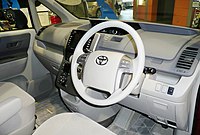
2007 Noah X interior
- Voxy

2007–2010 Voxy X (pre-facelift)
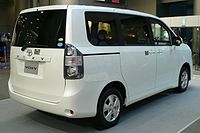
2007–2010 Voxy V (pre-facelift)

2007–2010 Voxy ZS (pre-facelift)
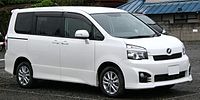
2010–2014 Voxy ZS (facelift)
- NAV1 (Indonesia)
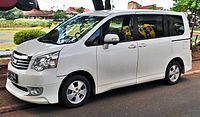
2013 NAV1 V (Indonesia)

2013 NAV1 V (Indonesia)
Third generation (R80; 2014)[]
| Third generation (R80) | |
|---|---|
 2014–2017 Noah G (pre-facelift) | |
| Overview | |
| Also called |
|
| Production | January 2014 – present |
| Assembly | Japan: Kariya, Aichi (Toyota Auto Body);[1] Toyota, Aichi (Motomachi plant, Voxy only)[7] |
| Powertrain | |
| Engine |
|
| Electric motor | 5JM AC synchronous motor (hybrid) |
| Transmission |
|
| Dimensions | |
| Wheelbase | 2,850 mm (112.2 in) |
| Length | 4,695–4,795 mm (184.8–188.8 in) |
| Width | 1,695–1,735 mm (66.7–68.3 in) |
| Height | 1,825–1,870 mm (71.9–73.6 in) |
| Curb weight | 1,560–1,730 kg (3,439–3,814 lb) |
The third-generation Noah and Voxy were introduced in January 2014. For the first time, an engine start stop system is used to improve fuel economy. It is also the first Toyota minivan to have one-touch sliding doors. In October 2014, the Toyota Esquire was launched, which was essentially the luxury version of the Noah. The Noah/Voxy/Esquire also receives Toyota's T-Connect services including a 10-inch infotainment display, with full navigation, ETC unit, online services, wireless phone charger, Noah Panoramic Live Sound System (eight speakers), rear parking camera with guidance lines, USB/AUX inputs as well as Toyota Safety Sense C which incorporates features such as collision warning, lane assist, as well as high beam assist.
Facelift[]
All three models received a facelift on July 3, 2017 with significant changes to the lights, hood (bonnet), bumper and the front fender.
Indonesia[]
The facelifted third-generation Voxy was launched at the 25th Gaikindo Indonesia International Auto Show on August 10, 2017. Unlike the preceding NAV1, which was assembled locally, it is imported from Japan. Export to Indonesia began in July 2017. It is only offered in one trim equivalent to Japanese ZS trim.[8][9]
Gallery[]
- Noah
2014–2017 Noah G (pre-facelift)

2014–2017 Noah Si (pre-facelift)
2014–2017 Noah Si (pre-facelift)

2017–present Noah X (facelift)
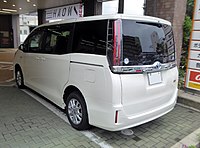
2017–present Noah Hybrid X (facelift)

2017–present Noah Si (facelift)

2017–present Noah Si (facelift)

Noah Si GR Sport

Noah Si GR Sport

2019 Noah G (facelift) TRD version

Noah X interior (facelift)
- Voxy
2014–2017 Voxy X C Package (pre-facelift)
2014–2017 Voxy ZS (pre-facelift)
2014–2017 Voxy ZS (pre-facelift)
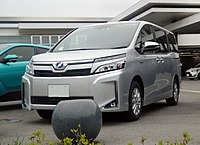
2017–present Voxy Hybrid V (facelift)

2017–present Voxy ZS Kirameki (facelift)
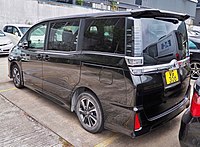
2017–present Voxy ZS Kirameki (facelift)

Voxy ZS GR Sport

Voxy ZS GR Sport

2018 Voxy (Indonesia)
- Esquire

2014–2017 Esquire (pre-facelift)

2014–2017 Esquire (pre-facelift)

2017–present Esquire Hybrid (facelift)

2017–present Esquire Gi (facelift)
Sales[]
| Calendar Year | Japan | ||
|---|---|---|---|
| Noah | Voxy | Esquire | |
| 2011[10] | 38,855 | 48,652 | |
| 2012[11] | 36,764 | 50,539 | |
| 2013[12] | 32,306 | 41,918 | |
| 2014[13] | 69,605 | 109,174 | N/A |
| 2015[14] | 53,965 | 92,546 | 59,034 |
| 2016[15] | 54,826 | 91,868 | 44,881 |
| 2017[16] | 58,729 | 86,772 | 43,210 |
| 2018[17] | 56,719 | 90,759 | 40,224 |
| 2019[18][19] | 52,684 | 88,012 | 40,553 |
| 2020[20] | 45,434 | 69,517 | 26,368 |
References[]
- ^ Jump up to: a b c d e "Affiliates (Toyota wholly-owned subsidiaries)-Toyota Auto Body Co., Ltd". Toyota Motor Corporation. 2012. Retrieved 2014-02-14.
- ^ "Toyota Nav1 Mulai Dirakit di Bekasi - Kompas.com". Kompas.com. Kompas Cyber Media.
- ^ Dadan Kuswaraharja (2012-12-21). "Merasakan Baby Alphard di Kota Udang" [Testing the Baby Alphard in the City of Shrimps]. detikOto. Retrieved 2015-02-07.
- ^ "Toyota NAV1 - the Noah minivan goes to Indonesia". Paul Tan's Automotive News. 2012-12-17. Retrieved 2017-07-28.
- ^ "Toyota NAV1 | MPV | Mobil keluarga premium terbaik Indonesia | Looks Good Feels Good | price-and-specifications" [The best family car premium Indonesia]. Indonesia: Toyota. Retrieved 2015-02-07.
- ^ Rayanti, Dina (2017-06-04). "Gantikan NAV1, Toyota Siapkan Voxy untuk Indonesia?". Detik Oto. Retrieved 2017-06-20.
- ^ "Japan | Global Operations | Facilities | Profile | Company". Toyota Motor Corporation Official Global Website. Retrieved 2021-05-14.
- ^ "GIIAS 2017: Toyota Voxy Resmi Meluncur!" [GIIAS 2017: Voxy Toyota Officially Launched!]. Oto (in Indonesian). indonesia. 2017-08-10. Retrieved 2019-05-20.
- ^ Satrio, y Hillarius (2017-08-10). "GIIAS 2017 : Toyota Voxy Sudah Diperkenalkan, Harganya..." [GIIAS 2017: Toyota Voxy introduced, the price is ...]. AutonetMagz (in Indonesian). Indonesia. Retrieved 2019-05-23.
- ^ "2011 Full Year Best-Selling Car Models in Japan". Car Sales Statistics. 2012-01-11. Retrieved 2020-04-24.
- ^ "2012 (Full Year) Japan: Best-Selling Car Models". Car Sales Statistics. 2013-01-10. Retrieved 2020-04-24.
- ^ "2013 (Full Year) Japan: Best-Selling Car Models". Car Sales Statistics. 2014-01-09. Retrieved 2020-04-24.
- ^ "2014 (Full Year) Japan: Best-Selling Car Models". Car Sales Statistics. 2015-01-08. Retrieved 2020-04-24.
- ^ "2015 (Full Year) Japan: 30 Best-Selling Car Models". Car Sales Statistics. 2016-01-08. Retrieved 2020-04-24.
- ^ "2016 (Full Year) Japan: 30 Best-Selling Car Models". Car Sales Statistics. 2017-01-11. Retrieved 2020-04-24.
- ^ "2017 (Full Year) Japan: Best-Selling Car Models and Mini Cars". Car Sales Statistics. 2018-01-11. Retrieved 2020-04-24.
- ^ "2018 (Full Year) Japan: Best-Selling Car Models and Mini Cars". Car Sales Statistics. 2019-01-10. Retrieved 2020-04-24.
- ^ "2019 (Full Year) Japan: Best-Selling Car Models". Car Sales Statistics. 2020-01-09. Retrieved 2020-04-24.
- ^ "乗用車ブランド通称名別順位 | 統計データ" [Ranking by passenger car brand name]. Japan Automobile Dealers Association (in Japanese). Retrieved 2021-07-10.
- ^ "【国産乗用車編】2020年12月&2020年1月~12月の登録車新車販売台数ランキング15を一挙公開!12月度も累計も全てトヨタ新型ヤリスが圧勝! | ページ 2". Creative Trend (in Japanese). 2021-01-08. Retrieved 2021-01-12.
External links[]
| Wikimedia Commons has media related to |
- Official website (Noah)
- Official website (Voxy, Japan)
- Official website (Voxy, Indonesia)
- Official website (Esquire)
| show |
|---|
- Toyota vehicles
- Cars introduced in 2001
- 2010s cars
- 2020s cars
- Minivans
- Front-wheel-drive vehicles
- All-wheel-drive vehicles
- Vehicles with CVT transmission
- Hybrid minivans
- Partial zero-emissions vehicles














